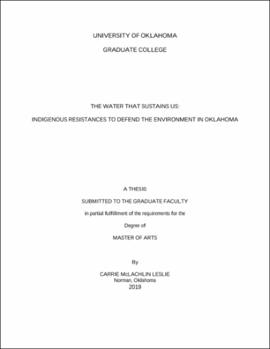| dc.contributor.advisor | Harris, Betty J. | |
| dc.contributor.author | Leslie, Carrie McLachlin | |
| dc.date.accessioned | 2019-04-03T14:35:13Z | |
| dc.date.available | 2019-04-03T14:35:13Z | |
| dc.date.issued | 2019-05-10 | |
| dc.identifier.uri | https://hdl.handle.net/11244/317835 | |
| dc.description.abstract | My research focuses on Indigenous people’s resistance movements to safeguard and sustain their natural environments. I would affirm that Indigenous-led resistance movements and actions to preserve the environment protect the water and natural environment for all people. Indigenous resistance movements that safeguard and sustain water and the environment achieve three critical paradigm shifts that advocate for environmental justice and undermine exploitative cycles of systemic violence and environmental racism. They are: a promotion of Indigenous environmental justice resistances, where people and the natural world are interdependent and mutually sustaining; a disrupting (and decolonizing) of settler-colonial processes, specifically in Oklahoma; and a dismantling of neocolonial global structures in Indigenous resistances to environmentally-destructive industrial oil production and infrastructure development at Standing Rock, and in Ecuador and Nigeria. These bold, transformative processes of water protection are being actualized by Indigenous people. | en_US |
| dc.language | en_US | en_US |
| dc.subject | Indigenous Resistances | en_US |
| dc.subject | Environmental Justice | en_US |
| dc.subject | Decolonization | en_US |
| dc.subject | Environmental Sustainability | en_US |
| dc.title | The Water that Sustains Us: Indigenous Resistances to Defend the Environment in Oklahoma | en_US |
| dc.contributor.committeeMember | Smith, Laurel C. | |
| dc.contributor.committeeMember | Klein, Misha | |
| dc.date.manuscript | 2019-04-01 | |
| dc.thesis.degree | Master of Arts | en_US |
| ou.group | College of Arts and Sciences::Department of Anthropology | en_US |
